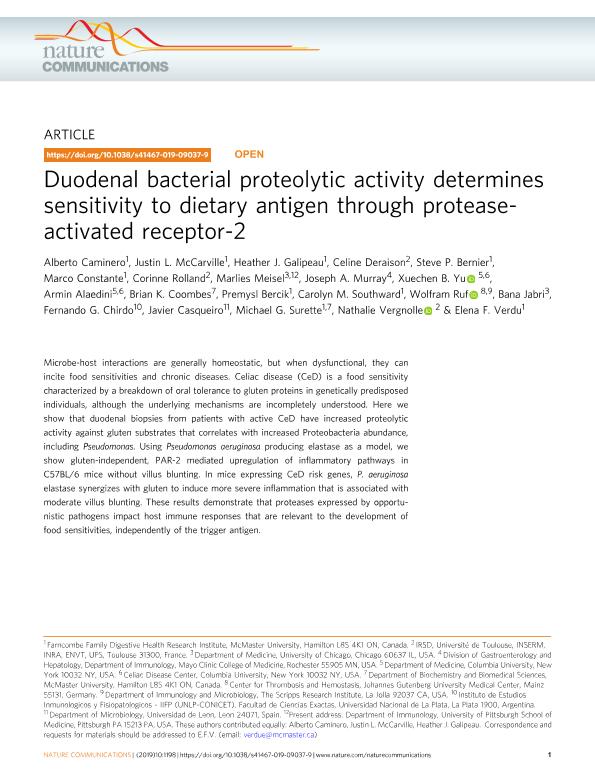Artículo
Duodenal bacterial proteolytic activity determines sensitivity to dietary antigen through protease-activated receptor-2
Caminero, Alberto; McCarville, Justin L.; Galipeau, Heather J.; Deraison, Celine; Bernier, Steve P.; Constante, Marco; Rolland, Corinne; Meisel, Marlies; Murray, Joseph A.; Yu, Xuechen B.; Alaedini, Armin; Coombes, Brian K.; Bercik, Premysl; Southward, Carolyn M.; Ruf, Wolfram; Jabri, Bana; Chirdo, Fernando Gabriel ; Casqueiro, Javier; Surette, Michael G.; Vergnolle, Nathalie; Verdu, Elena F.
; Casqueiro, Javier; Surette, Michael G.; Vergnolle, Nathalie; Verdu, Elena F.
 ; Casqueiro, Javier; Surette, Michael G.; Vergnolle, Nathalie; Verdu, Elena F.
; Casqueiro, Javier; Surette, Michael G.; Vergnolle, Nathalie; Verdu, Elena F.
Fecha de publicación:
13/03/2019
Editorial:
Nature Publishing Group
Revista:
Nature Communications
ISSN:
2041-1723
Idioma:
Inglés
Tipo de recurso:
Artículo publicado
Clasificación temática:
Resumen
Microbe-host interactions are generally homeostatic, but when dysfunctional, they can incite food sensitivities and chronic diseases. Celiac disease (CeD) is a food sensitivity characterized by a breakdown of oral tolerance to gluten proteins in genetically predisposed individuals, although the underlying mechanisms are incompletely understood. Here we show that duodenal biopsies from patients with active CeD have increased proteolytic activity against gluten substrates that correlates with increased Proteobacteria abundance, including Pseudomonas. Using Pseudomonas aeruginosa producing elastase as a model, we show gluten-independent, PAR-2 mediated upregulation of inflammatory pathways in C57BL/6 mice without villus blunting. In mice expressing CeD risk genes, P. aeruginosa elastase synergizes with gluten to induce more severe inflammation that is associated with moderate villus blunting. These results demonstrate that proteases expressed by opportunistic pathogens impact host immune responses that are relevant to the development of food sensitivities, independently of the trigger antigen.
Palabras clave:
Celiac Dsease
,
Microbiota
,
Mucosal Immunity
Archivos asociados
Licencia
Identificadores
Colecciones
Articulos(IIFP)
Articulos de INST. DE ESTUDIOS INMUNOLOGICOS Y FISIOPATOLOGICOS
Articulos de INST. DE ESTUDIOS INMUNOLOGICOS Y FISIOPATOLOGICOS
Citación
Caminero, Alberto; McCarville, Justin L.; Galipeau, Heather J.; Deraison, Celine; Bernier, Steve P.; et al.; Duodenal bacterial proteolytic activity determines sensitivity to dietary antigen through protease-activated receptor-2; Nature Publishing Group; Nature Communications; 10; 1; 13-3-2019; 1-14
Compartir
Altmétricas



